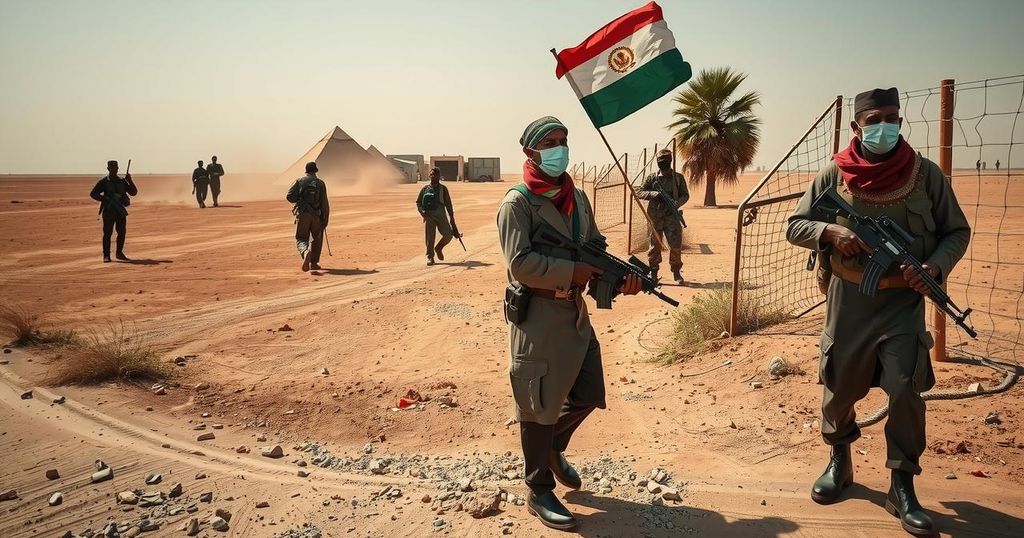Escalating Smuggling Crisis Along the Sudanese-Egyptian Border Amid Conflict

The Egyptian military intensifies efforts against burgeoning smuggling activities along the Sudanese border, where gold, fuel, and weapons trafficking have surged due to the ongoing conflict in Sudan. Smugglers exploit border instability, with local tribes playing a significant role in these operations. Despite military crackdowns, thriving illegal trade exacerbates tensions in contested regions, highlighting broader regional insecurities.
The conflict in Sudan, which commenced in April 2023, has precipitated a surge in illicit smuggling operations along the Sudanese-Egyptian border. With the security environment deteriorating, smugglers have expanded their activities to include gold, fuel, weapons, and human trafficking. The Egyptian military is combatting this escalating smuggling issue by deploying helicopters, snipers, and heavy artillery, resulting in fatalities among smugglers in contested border areas. While authorities effectively regulate fuel smuggling, they appear to overlook gold shipments to Egypt due to their economic benefit.
Reports indicate that gold flowing from Sudan into Egypt has seen a sharp increase since the outbreak of conflict, with dangerous materials such as mercury and cyanide illegally transported northward as smugglers capitalize on the instability. Conversely, surveys illustrate that cheap Egyptian fuel and essential supplies are being heavily trafficked into Sudan, behoving local gold mining operations.
The smuggling strategy is chiefly executed by individuals from tribes like the Ababda, Rashaida, and Bishari, who operate on both sides of the border. Many sources testify that the fuel from Egypt serves as a crucial resource for gold mining in Sudan, where it is sought after by both the military and agricultural sectors. Smugglers face dangers from armed confrontations with the Egyptian military and rival gangs, leading to a chaotic and deadly atmosphere in the border regions.
Significantly, the violence is escalating, particularly in disputed regions such as the Halaib Triangle, where tensions have risen over gold mining rights. Combatants frequently clash, leaving miners injured and displaced. Furthermore, the presence of local and international companies—many allegedly allied with the Egyptian government—has intensified competition over gold resources, as they seek to monopolize the rich mining areas. The complex dynamics of gold mining and smuggling are emblematic of broader regional tensions that encompass not only Egypt and Sudan but also multiple neighboring countries.
Local analysts have voiced concerns over increased smuggling activities and the economic impacts it poses amid the ongoing conflict in Sudan. The situation calls for immediate attention to address the security and humanitarian crises precipitated by the rising tide of illicit trafficking in these conflicted border regions.
The Sudanese-Egyptian border region has become a critical area for illicit smuggling activities exacerbated by the ongoing civil conflict in Sudan. The war has created a security vacuum that smugglers exploit to transport various goods across the border. The main commodities traded include gold, fuel, and weapons, with the Egyptian military responding with force to curb the rampant illegal trade. Fluctuating local economies due to the conflict, coupled with tribal affiliations and historical smuggling practices, have deepened the complexities surrounding this border region.
In conclusion, the unfolding situation along the Sudanese-Egyptian border exemplifies the dire implications of regional conflict, as violent smuggling operations flourish amidst a backdrop of instability and economic desperation. The Egyptian military’s aggressive stance against smugglers reflects the broader geopolitical and economic consequences of the ongoing Sudanese war. The challenges posed by smuggling, coupled with humanitarian crises and territorial disputes, necessitate comprehensive strategies to stabilize this tumultuous border region.
Original Source: www.middleeasteye.net








